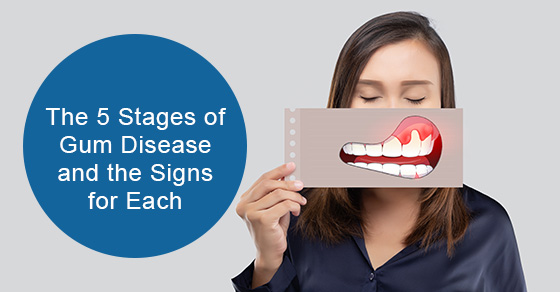
Unfortunately, gum disease can lead to tooth decay, bone loss, and the need for dentures or fake teeth. It can affect your teeth, gums, and the overall health of your mouth. Approximately 50% of people aged 30 or older have been affected by periodontal disease. Sadly, periodontal disease can advance and grow worse over time, especially if left untreated and neglected.
With that in mind, here are the 5 stages of gum disease and the signs and symptoms for each. Read on to discover what exactly is periodontal disease, the stages, and how you can prevent yourself from developing (or progressing in) the disease.
What is periodontal disease?
Simply put, periodontal disease is an infection that affects the gums and the jaw bone, which can lead to major tooth loss. Periodontal disease is mainly caused by poor oral hygiene habits and forgoing brushing, flossing, and dental cleanings. It occurs because of plaque build-up over time and can progress to worsen and even be irreversible after a certain stage.
Stages of Periodontal Disease
Here, we will highlight some of the main stages of periodontal disease and the signs and symptoms for each stage. Keep in mind that the rate at which periodontal disease progresses can be different for each person, and what is true for one person may not be necessarily true for another. Read below to educate yourself on what to look out for when it comes to periodontitis.
Healthy Mouth
Cases of periodontal disease start with a healthy, functioning, and normal mouth. This essentially means that anyone can be a candidate for periodontal disease, even those who have no prior family history or existing conditions. The first sign of periodontal disease is usually bleeding gums. Even healthy gums can experience bleeding occasionally, so take notice of bleeding in your mouth and how often it happens.
Gingivitis
Once diagnosed with gingivitis (the first stage of periodontal disease), your dentist will tell you that you should start to prioritize proper brushing and flossing. Signs of gingivitis include plaque build-up that can cause irritation to the gums and swelling. A white discharge called exudate may also be present, and your gums may be bleeding more than normal. Other symptoms of gingivitis include receding gums and persistent bad breath.
Early Periodontitis
The early warning signs of periodontal disease include pain and sensitivity in the mouth, periodontal pockets, and spaces in between the teeth. In this stage, the disease is no longer reversible, although it is manageable. You will need to follow up closely with your dentist and stick to a strict oral hygiene regime. Symptoms will worsen at this stage as the infection spreads to the bone and begins destroying those areas.
Moderate Periodontitis
At this third stage of periodontal disease, the probing depths at which the bacteria and infection reaches are much farther, and bacteria can reach your bloodstream and begin to attack your immune system as well. In order to prevent teeth shifting and bone/tooth loss, deep cleaning (scaling and root planing) is required by your dentist regularly.
Advanced Periodontitis
At the advanced stage of periodontitis, the infection has progressed even deeper, and you are now 50% to 90% at risk of bone loss. This can be extremely detrimental to your oral health and the state of your teeth/gums. Teeth can become loose and make chewing painful. Your gums may also be red, swollen, and oozing with pus. What once was bad breath may now be full-blown halitosis.
If periodontal disease is left untreated at this stage, the result could be dentures, major loss of teeth, and other health problems. It’s important to act quickly and wisely. Periodontal surgery or laser therapy may be required at this stage to get an even deeper cleaning than what a dentist can regularly provide. Regardless, it’s important to speak with your dentist and schedule regular appointments before the disease can even get to this point.
Preventing Periodontal Disease
To effectively prevent periodontal disease, you should have a plan regarding your oral care and hygiene. Seek out a qualified and reputable dentist and hygienist who can help manage your oral care and detect certain issues before they arise or become problematic.
Preventing periodontal disease is all about creating healthy hygiene habits when it comes to brushing, flossing, and regular dental check-ups. Always follow the advice of your dentist when it comes to oral hygiene, and if you are unsure of proper methods, please ask. After all, prevention is much better (and easier) than cure!
When seeing a dentist regularly, periodontal disease and the symptoms can easily be detected and managed. A good dentist will keep an eye out for these signs and help ensure that the disease doesn’t progress. Of course, some of the responsibility will be up to you and relies heavily on your aftercare and your own oral hygiene care. Always follow your dentist’s instructions for the best results and a clean, healthy mouth.
For more information on periodontics and periodontal disease in Mississauga and the GTA, please call Bristol Dental Clinic at 905-712-3409 or contact us here. We care about the dental health of our clients and their families. Please contact us for more information on our services and on how we can be of service to you.


Thanks for this content. This is very informative and well detailed topic. It caught my attention seriously. Thanks for this post.